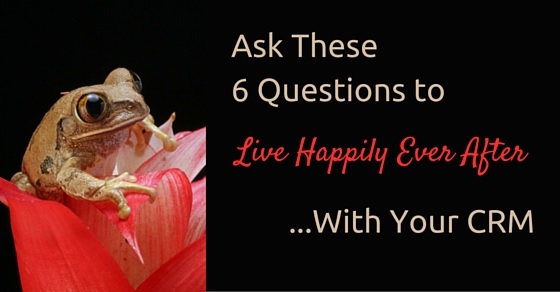How to Choose the Right CRM for Your Business
The right questions to ask so you don't waste precious time

With the incredible amount of CRM systems available in the world, it may become a daunting task figuring out which CRM system is right for you! (Almost as hard as finding your soulmate!)
Here is a list of questions you should clarify before you test out any system so you don’t waste precious time on CRMs that won’t actually fit your needs.
1. Do you want any software stored on your local server (“On Premises”) or do you prefer everything to be “cloud” based (SaaS)?
- Having information stored on a local server gives you more control over the data and security management, and allows you to customize and integrate your CRM with other business applications. You will need an IT person to set this up for you.
- Many argue that fear of data security breaches is a concern of the past, and highly prefer the ease and accessibility of cloud based CRMs. Brent Leary, the co-founder of Atlanta-based CRM Essentials, suggests that you have nothing to fear. “A few years ago the question of data security was definitely more of a topic than it is now. If companies like Cisco are willing to put their information in the cloud then small businesses should feel pretty secure as well. These Internet companies spend millions, if not, thousands of dollars to put things in place like redundant systems to protect your data.”
2. How many employees will be using the CRM and are they actually able to use it?
- Many CRM systems provide free use for smaller companies, while others were designed to specifically take care of the needs of much larger companies and corporations.
- Make sure the CRM fits your company’s office culture. If your employees have to spend too much time feeding information into the CRM, or the layout makes it difficult to coordinate across departments, then the CRM is ineffective.
3. What features are you looking for in a CRM?
What are you planning to use the CRM for? Here are a few ideas of potential uses:
- keeping track of contacts and customers
- lead tracking
- sales results analysis
- streamlining social media
- lead generation
- accounting
- follow-up automation
- storing documents
- mobile access
- email integration
- adaptability and customization of tasks
Make a list of the functions you need, and check that the CRM you’re considering answers those requirements.
4. Vendor Strength and Expertise
- What are the strengths and weaknesses of each company? How long has the company been around? Is the system able to grow with your company? How does the company handle customer service and assistance in setting up?
- Do they have an area of expertise (created for non-profits, tech companies, small businesses, etc.)? Do they have partnership or easy integration with other companies like Microsoft Outlook, Dropbox, Google Apps, social media, etc.?
5. How long does it take to implement?
- Some CRMs are quick and easy to implement while others may take a much longer time to set up and transfer all your current data.
- Think about when you want to implement your new CRM and how much time you can dedicate to doing so. Make sure to look at your company’s calendar for anything big that might take away from implementing the CRM.
6. How much does it cost? (Had to ask that one!)
- Cost is, of course, a big factor. Small, lightweight CRMs are relatively inexpensive and some are even free.
- If you are looking for a more app heavy CRM and you have a lot of employees, compare prices.
All CRMs offer a trial period. Before you buy it, try it! See if you like the layout, if it’s easy to learn and manage, if it increases efficiency and transparency, and if it works well with the hardware you have in place.
Happy hunting!
 Submitted by Zehava
Submitted by Zehava
